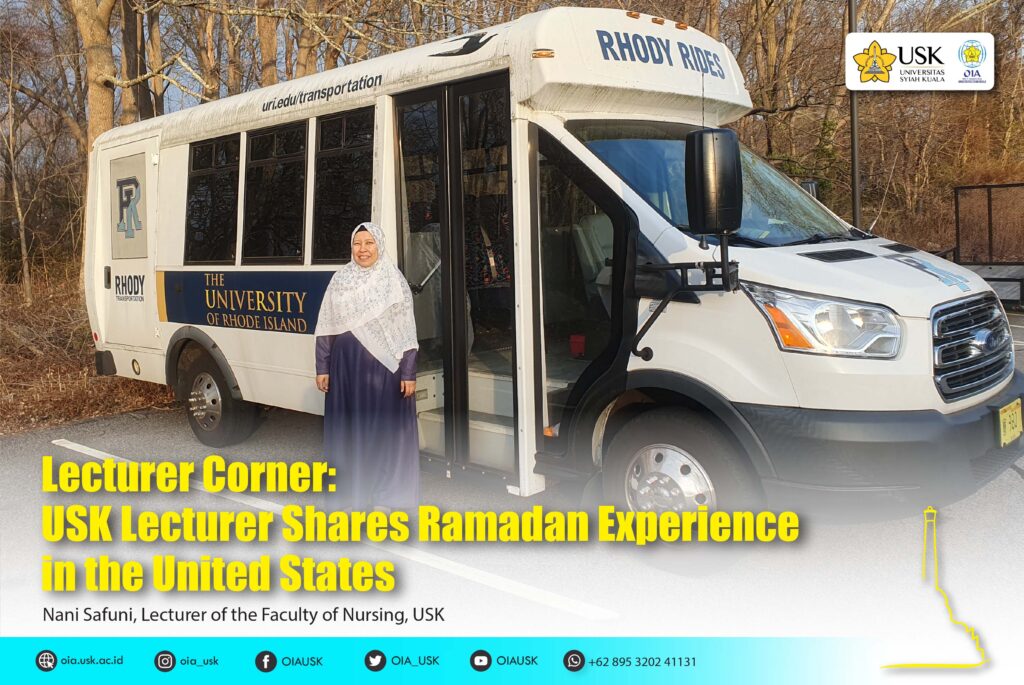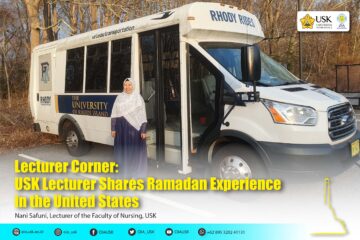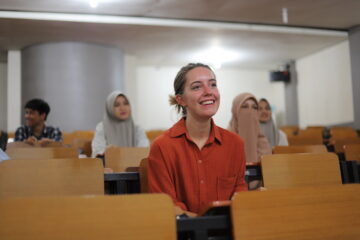USK Lecturer Shares Ramadan Experience in the United States

Cranston, Rhode Island – This year’s Ramadan has been a unique experience for Nani Safuni, a lecturer at the Faculty of Nursing, Universitas Syiah Kuala (USK), who is currently participating in the Barcott-Kim Fellowship in Nursing program at the University of Rhode Island, USA. As part of the program, Nani also serves as a teaching assistant for undergraduate nursing students at the university.
Since her arrival in Cranston, Rhode Island, in late summer 2024, Nani has faced the challenge of fasting in an environment different from her hometown of Banda Aceh. “This is my first Ramadan here. Observing the fast in a foreign country certainly comes with its challenges, such as continuing with regular academic activities,” she shared.
Nevertheless, she finds it helpful that the prayer times in the U.S. are not too different from those in Indonesia. “It’s already spring here, so the five daily prayer times are quite similar to the schedule back home,” she added.
Ramadan in Aceh vs. the United States
According to Nani, the most striking difference between Ramadan in Aceh and in the United States is the smaller Muslim population and the limited number of mosques. “Here, you can only hear the call to prayer if you’re inside a mosque,” she explained. Despite this, she found that mosques in Rhode Island are very welcoming to everyone, including non-Muslims who want to learn about Islam.
One of the mosques she visited is Al-Kareem Mosque, which is also known as the Rhode Island Islamic Center. “This mosque is quite spacious and located near downtown. The religious activities held there bring a strong Ramadan atmosphere,” she said.
Unique Traditions in the United States
Beyond the differences in observing Ramadan, Nani also discovered some unique American traditions, such as Halloween and Thanksgiving. “People here decorate their homes with Halloween ornaments one to two months in advance. Children also go door to door asking for candy,” she explained.
As for Thanksgiving, she mentioned that almost every family roasts a turkey to enjoy together. “I even joined in the turkey hunt to enjoy it with my friends here. It was such a fun experience,” she added.
Ramadan Atmosphere and Iftar Gatherings
Although Ramadan in the U.S. isn’t as lively as in Aceh, mosques still actively organize iftar (breaking fast) gatherings and congregational tarawih prayers. Nani often breaks her fast at Al-Huda Mosque in Kingston, near the University of Rhode Island. “Here, attendees don’t need to bring anything. The organizers provide abundant food, even enough to take home for sahur,” she said.
Iftar gatherings at Al-Huda Mosque are held every weekend, while on weekdays they only hold tarawih prayers. “I really enjoy the Middle Eastern food served, like hummus and baklava,” she noted.
Challenges and Adaptation
One of the main challenges Nani faced during Ramadan in the U.S. was dealing with the cold weather. “The chilly wind can be quite distracting, especially during commutes to and from campus,” she explained. To overcome this, she tries to maintain a nutritious diet to keep her energy up throughout the day.
Although Ramadan isn’t as visible in daily American life, many people are aware of the Islamic fasting practice. “One of my classmates once offered me a drink after seeing I looked pale after the noon prayer. They were surprised when I explained that fasting in Islam means abstaining from both food and drink,” she said.
The Muslim Community in the U.S.
Despite living in a country with a relatively small Muslim population, Nani feels warmly welcomed by the local Muslim community. “Muslims here welcome Ramadan with great joy, just like in other parts of the world,” she said.
Through her Ramadan experience in the United States, Nani has not only learned to adapt to a new environment but also gained a deeper understanding of cultural diversity and how Islam continues to thrive across the globe. “Spending Ramadan here has been a truly valuable and eye-opening experience for me,” she concluded.

